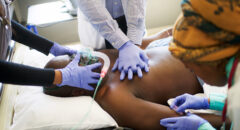
Are you noticing a weight increase of three pounds over 24 hours or even five pounds within the week? Such rapid weight gain or swelling may be very common with heart failure.
Why does heart failure cause weight gain?
Heart failure, also known as congestive heart failure, is progressive and affects the pumping action of heart muscles. It is very common, with over 3 million cases annually in the United States. Heart failure is also common in females and people age 60 and over.
The weight gain or swelling you may be experiencing could be from fluid accumulation or retention caused by heart failure.
With heart failure, the blood may flow to and from the heart more slowly, affecting the function of other major organs. This results in the collection of fluid in the tissues, which causes weight gain and swelling.
Protect Your Heart: What to Do After a CHF Diagnosis
Symptoms of weight gain congestive heart failure
The weight gain and swelling may take place in the ankles, feet, legs, and stomach area.
In addition, other symptoms and signs of heart failure include:
- Confusion or dizziness
- Difficulty sleeping or lying flat
- Fatigue and weakness
- Feeling breathless while resting
- Frequent coughing or wheezing
- Irregular or rapid heartbeat
- Loss of appetite
- Pulmonary Edema – fluid collecting inside the lungs
Heart failure medications and weight gain
There isn’t a cure for heart failure but there are treatments to relieve the symptoms, which can
further help with the weight gain.
Medications, with most of them improving heart function and life expectancy, include:
- ACE inhibitors or ARB drugs
- Aldosterone inhibitors
- Anticoagulants or antiplatelets
- Beta-blockers
- Digital glycosides
- Diuretics
- Tranquilizers
- Vasodilators
READ: How to Increase Your Life Expectancy With Heart Failure
Tips to prevent rapid weight gain after heart failure
The best way to prevent those added pounds is to start with the prevention of heart failure. Conditions or actions that contribute to heart failure include: Being overweight, eating foods with saturated fats, sodium, sugar, or trans fat, and smoking.
If you already have heart disease, taking steps to lose weight, choosing heart-healthy foods, and avoiding smoking (and secondhand smoke) will help with the weight gain.
Other actions you can take include reducing sodium in your diet and the fluids you take in daily.
Monitoring your intake of these daily will help you determine what effects they have on your weight gain and how much you need to decrease sodium and fluids daily.
Most importantly, seek medical attention if you are experiencing any of these symptoms of heart failure.








